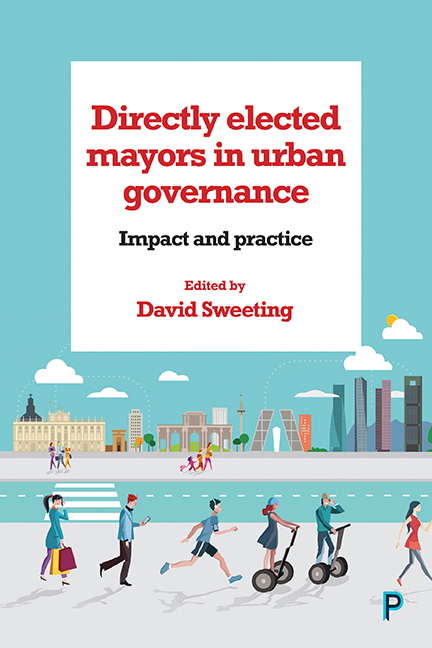four - Do mayors make a difference? In their own words…
Published online by Cambridge University Press: 05 April 2022
Summary
Introduction
This study is based on interviews with 12 elected mayors in eight communities, conducted between 2003 and 2014. The communities were all in the North East of England or the Midlands. They ranged from small towns to a major city. In one town we were able to interview three successive holders of the office. In another case we interviewed two mayors. We were unable to interview other actors in most of the communities involved, carry out observations of the activities of the mayors or assess objectively the impact of their periods in office. However, most mayoral offices have survived: only two of our selected mayoralties were subsequently abolished by referendums. A third survived a referendum proposing abolition of the office. The office survived but the incumbent mayor, an independent, lost the subsequent election to a Labour candidate. All this suggests that the office, once established, has usually won and retained public support, although specific incumbents have lost office.
The advantage of research focused on a series of semi-structured interviews over more extensive single case studies of individual mayors and their communities is that it has enabled us to identify the wide range of mayoral responses to the various issues that confront them (see also Copus, 2006). They included the management of their local authorities, including their relationships with the council and its party groups, their Chief Executive Officers and other senior staff. It also identifies the varying ways in which mayors deal with their relations with outside bodies and other authorities including the local business community and a wide range of other interest and lobby groups, as well as well as with the wider citizenry. The main analysis here, to discuss whether or not elected mayors think they have made a difference within their governmental milieu, will be conducted using the three leadership roles identified in the political leadership matrix (Elcock and Fenwick, 2012). The government role includes leading and managing the local authority of which they are the elected heads; their governance roles – the way they have developed their relations with other governments and organisations, including business, trades unions, the NHS and others, as well as with other local authorities and the central government. Last come their allegiance roles: their approach to maintaining their support in their councils, parties and the public together with their campaigning to secure re-election.
- Type
- Chapter
- Information
- Directly Elected Mayors in Urban GovernanceImpact and Practice, pp. 53 - 68Publisher: Bristol University PressPrint publication year: 2017



